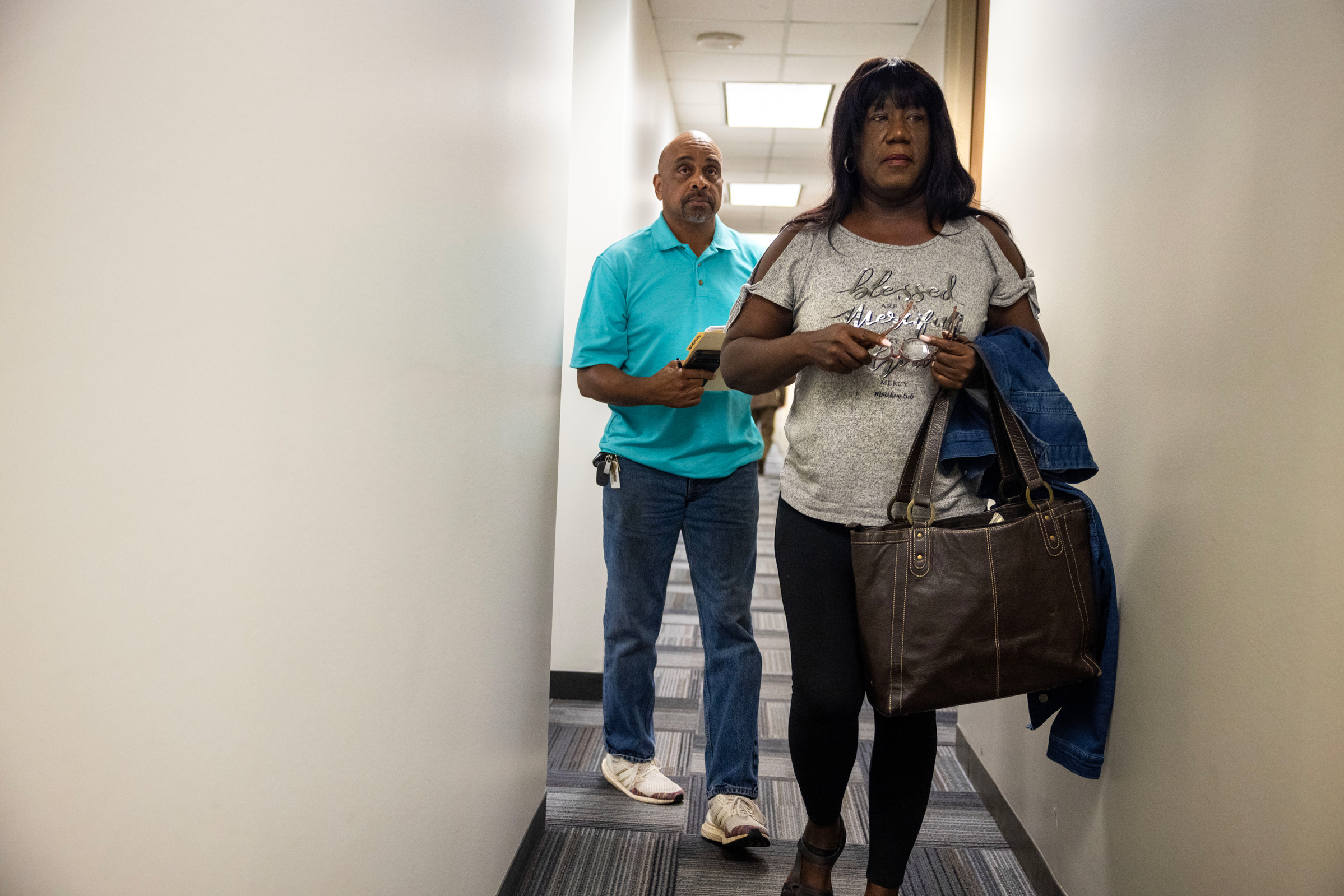|
Getting your Trinity Audio player ready...
|
Jeffrey and Helen Lowery left the Harris Central Appraisal District on Wednesday feeling disappointed and not heard.
The couple, who own a home in north Harris County, have been coming to HCAD for years to protest their annual home appraisal.
After the Lowerys purchased their property in 2016, the picturesque wooded area behind their home, a selling point for the couple, was cut down. They say that lowers the value of their property.
HCAD disagrees.
Year after year, the appraisal district, which determines the value of all Harris County properties for taxing purposes, has increased the Lowerys’ home value by 10 percent. The annual bumps contribute to the couple’s higher property tax bill and do not accurately reflect what they believe they could sell their home for.
Reducing property taxes has been a top priority of Republican state leaders for years. A disagreement between the Texas House of Representatives and Senate on how best to cut taxes ended in a deadlock during the regular legislative session, prompting the governor to call two special sessions.

House leaders have pushed a plan to further restrict how much property appraisals can increase in a year. The Senate, however, passed a bill aimed at reducing property taxes by raising homestead exemptions. The two chambers ended the regular session deadlocked over how to achieve a significant property tax reduction.
Texas has a 10 percent cap on appraisal increases for residential property on which the owner has obtained a homestead exemption. The measure was meant to help curb property tax bills for residents, former Harris County Judge Ed Emmett said.
The cap prevents taxable home values for residents who have a homestead tax exemption from increasing by more than 10 percent a year, regardless of how much the property’s market value has increased.
The standard residential homestead exemption in Harris County is 20 percent and can be claimed only on a property used as the owner’s principal residence. With a 20 percent exemption, a home appraised at $200,000 is only taxed on $160,000, or 80 percent, of its value.
Generally, appraisal caps are meant to function as a circuit breaker of sorts to stop runaway property value increases, said Jennifer Rabb, president of the Texas Taxpayers and Research Association.
The average single year value increase across Texas is about 5 percent.
The appraisal cap was meant to limit homeowners’ property tax burden when costs were on the rise, but some experts worry the cap does not actually accomplish that.
How homes are appraised
Homeowners like the Lowerys receive an appraised value of their property each year for taxing purposes.
All properties must be appraised at their market value, but the state’s tax code includes exceptions for homeowners who claim a homestead tax exemption.
Those property owners’ home values can increase a maximum of 10 percent from the previous year.
With approximately 1.8 million properties in Harris County, HCAD cannot conduct individual inspections on each property every year, Chief Communications Officer Jack Barnett said.
Instead, the district uses a mass appraisal system, Barnett said.
That means HCAD looks at home sales within a given neighborhood that share similar quality, size and other characteristics. That comparison helps generate a home’s appraised value.
After determining property values, he said, the appraisal district shares that information with taxing entities like the city of Houston, Harris County and various school districts, so those offices can set tax rates and create budgets. HCAD does not collect any taxes or set a property tax rate.
Disproportionate benefits
When Manish Bhatt, a senior policy analyst at the Tax Foundation thinks about Texas’ homestead appraisal cap, he thinks about good intentions.
“That doesn’t mean that a well-intended action always has a beneficial outcome,” Bhatt said.
And the outcome of the state’s homestead appraisal cap, he said, is skewed to the benefit of longtime property owners.
Rabb agreed.
Over time, she explained, a homeowner who has lived in a house for many years could pay far less in property taxes than a neighbor who only recently moved into a similar home because of years of capped appraisal value.
Rabb also said residents with higher income receive disproportionate benefits from the appraisal cap.
She cited February’s Texas Comptroller’s Tax Exemptions and Tax Incidence Report, which projects that by 2025 households across Texas will save $490.6 million dollars from the 10 percent appraisal cap.
Households in the state’s highest income quintile — those making more than $166,000 a year — will receive nearly 40 percent of those savings.
Households with residents making less than $100,000 a year — the lowest three income quintiles combined — will receive about 23 percent of those savings.
“The homestead appraisal cap benefits higher value homes more than lower value homes,” Rabb said. “Which translates to, it benefits the wealthy more than it benefits the poor.”
Along with lower-income property owners in areas with little growth, commercial property owners also miss out on appraisal cap benefits, Rabb said.
There is no appraisal cap for properties without homestead exemptions, meaning commercial and industrial property owners, as well as homeowners who do not file for the homestead exemption, are taxed on the basis of the full market value of their properties.
Legislative compromise
Appraisal caps were at the center of months of gridlock and debate among state lawmakers throughout this year’s legislative session.
For months, various proposals swirled about how lawmakers should make good on Gov. Greg Abbott’s campaign promise to lower property taxes.
A proposal from the House of Representatives would have narrowed the appraisal cap to 5 percent and expanded it to include non-homestead properties, according to the Texas Tribune.
Both Rabb and Bhatt, along with other tax policy experts, were skeptical of that idea, fearing that further capping appraisals would distort the housing market.
Meanwhile, the Senate approved its own bill that would have reduced property taxes by raising the school homestead exemption.
Neither chamber was willing to budge on its method for cutting taxes, and the regular session ended without a bill. The governor has called two special sessions with the sole purpose of enacting a significant property tax cut, and has been vocal in his support of the House plan to further restrict appraisal growth.
Ultimately, lawmakers came to a compromise earlier this week.
The compromise allocates about $12.6 billion to reduce the school property tax rate. It also includes an increase to the state’s homestead exemption from $40,000 to $100,000, according to the Tribune.
The legislation also would add a three-year 20 percent appraisal cap on non-homestead properties valued at or below $5 million.
Despite the addition of a temporary commercial appraisal cap, the compromise does not change the state’s cap on homestead appraisals.
The Senate approved the compromise bill Wednesday. The House is expected to do the same Thursday, sending the bill to the governor’s desk by the end of the week.




